©
2004 Jeff Matthews & napoli.com
Strikes
 Strikes
are common occurrences in Italy. Generally, they are not the tooth-and-nail
labor/management battles to the death that they are elsewhere. More
than anything else, they last a day and are meant to disrupt the economy
just enough to provoke some sort of settlement, even if it's just a
quick fix. Strikes
are common occurrences in Italy. Generally, they are not the tooth-and-nail
labor/management battles to the death that they are elsewhere. More
than anything else, they last a day and are meant to disrupt the economy
just enough to provoke some sort of settlement, even if it's just a
quick fix.
Nevertheless,
the term "general strike" has an ominous ring to it: factories closed,
public transport at a standstill, helmeted and betruncheoned police
holding the line against the onlaught of banner-waving, oppressed workers
singing The Internationale in all major and minor keys at the same time,
etc. There was a general strike yesterday in Naples. Yesterday
also coincided with one of the "Green Days", those days on which you
can't drive your car unless it is equipped with a catalytic convertor.
Thus, it was pretty much of a stay-at-home day for me unless I --shudder--
wanted to walk to the post office to pay some bills via the handy postal
money-orders that everyone now uses.
Wait. The
post office is a state entity, and postal workers belong to the same
great umbrella labor union that just called a strike. Call up first
and ask:
"Yes, most
of the post offices are closed, but we're open here. We don't belong
to that union."
Good news
-- the post office is open. Bad news -- everyone else in Naples will
be in line trying to pay bills in that one post office . Even worse,
they will all be driven to some ecstatic degree of consumer rage by
the fact that they have to walk to the one open post office in the neighborhood
and wait an hour in line. I take a chance. (A fistfight with a queue-jumper
in the post-office is a small price to pay.) I walk into the post office
and it is absolutely Twilight Zone empty. The only one in the building
is Post Office Lady behind the glass window -- and she might be an alien.
I carefully step around the crop circle in the middle of the floor,
walk over and pay my bills in no time flat.
(later
that evening). The TV says that the strike was only a partial success
since it was boycotted by two other big labor unions. Nevertheless,
in spite of my success at the post-office, I went for a forced march
in the afternoon because there wasn't even one-third of scab strike-breaking
bus to be seen anywhere.
Russo,
Ferdinando
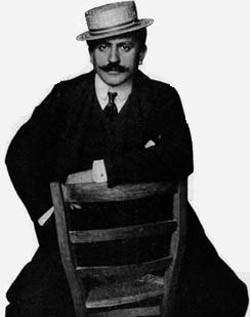 I
came across a short selection of items by Ferdinando Russo (1866-1927),
a Neapolitan journalist primarily remembered today as a dialect poet
and composer of song lyrics. In any event, the small volume is called
La Camorra, and the five separate items in the book appeared
as separate articles from January to May of 1897 in il Mattino,
still the largest Neapolitan daily newspaper. I
came across a short selection of items by Ferdinando Russo (1866-1927),
a Neapolitan journalist primarily remembered today as a dialect poet
and composer of song lyrics. In any event, the small volume is called
La Camorra, and the five separate items in the book appeared
as separate articles from January to May of 1897 in il Mattino,
still the largest Neapolitan daily newspaper.
“Camorra”
is the Neapolitan name for the local version of the Mafia (itself, really
a Sicilian term). The articles were meant somewhat as an expose of the
life-style of organized crime in the Naples of the day. The first one
is called: Le Donne dei Camorristi (Women of the Camorra). Here
is some of that article [the translation is mine]:
| Mothers
and wives are most often the victims of these picturesque scoundrels.
These women are brutally exploited in every possible way. Dominated
-- I dare say “hypnotized—by their own sons and husbands,
these unhappiest of women are put through great hardship and sacrifice.
The
mothers, of course, are much less scorned and ill-treated than
the wives. You know that from the very songs you hear improvised
in bars and prisons, the really true folk music –of the
people. In that brand of intensely sentimental, but sincere,
music, they only sing about two kinds of women: mothers and
lovers. Find me just one song about a wife! – I mean a
real song, not one of these ditties turned out by paid hacks
for the music festival of Piedigrotta. No, wives are held in
lower esteem – and this is no exaggeration-- than
women sold at Arab slave markets. Mothers, on the other hand,
have their little delicate, sentimental niche in the hearts
of these cynical scoundrels.
|
Recent
plaque to Russo at the entrance to the port of Naples
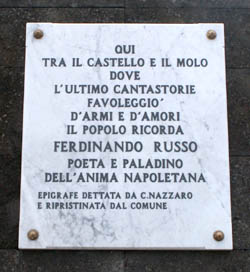 Russo
goes on to cite, in Neapolitan dialect, a few popular verses in which
camorra jailbirds sing the praises of their wives and lovers on
the outside. As for the lovers, themselves: Russo
goes on to cite, in Neapolitan dialect, a few popular verses in which
camorra jailbirds sing the praises of their wives and lovers on
the outside. As for the lovers, themselves:
| It
is impossible to describe the enormous power of these vile creatures,
so bound as they are to their vampires, how these witches will
even cynically commit crimes just to please their masters. The
more they are abused and beaten by men, the more they come to
view such treatment as a natural sign of love; that is their understanding
of tenderness. They are not sure of being loved unless that love
is shown to them in its own very special way – with a club
or a razor… The man who doesn’t beat them is destined
to betray them – that is how they feel. They laugh at such
a fool and go on to the next lover. ‘A man has to be a man,’
I heard one of these pathetic creatures say, as she talked enthusiastically
of her new lover, who beat her, and heaped scorn on the head of
the man she had just left – one who never touched a hair
on her head. |
The last
paragraph is given over to the long-suffering wife as she witness from
afar the other women taking gifts and food into the prison for the husband:
| And
the poor wife –-who has been unable to scrape together anything
for her husband— watches forlornly from a distance, through
the gates, not daring to approach for fear of the insults. She
bears the sight of the other woman walking in like a queen to
console him with her gifts, the results of a week of her own shame
and humiliation. |
Motorcycles
(1)
 The
son of the mechanic who works on my car got in a traffic accident the
other day. Nothing serious, but he did spend the night in the hospital
for observation because of a minor concussion. He went off his motorcycle
and into a car. Of course, he was not wearing a helmet -- this in keeping
with the proud skull service that Neapolitans pay to their well-known
streak of suicidal anti-authoritarianism. My own unscientifc surveys
(I stand on the corner and count) show that only about half of those
who ride on scooters and motorcycles bother to wear helmets. The
son of the mechanic who works on my car got in a traffic accident the
other day. Nothing serious, but he did spend the night in the hospital
for observation because of a minor concussion. He went off his motorcycle
and into a car. Of course, he was not wearing a helmet -- this in keeping
with the proud skull service that Neapolitans pay to their well-known
streak of suicidal anti-authoritarianism. My own unscientifc surveys
(I stand on the corner and count) show that only about half of those
who ride on scooters and motorcycles bother to wear helmets.
One of
the most popular TV programs in Italy is Striscia la notizia.
It does everything from poking fun at Freudian slips of the tongue by
newscasters to exposing corruption involving the black market sale of
residence permits to illegal immigrants. Periodically, they dwell on
the fact that so few two-wheeled motorists in Naples (and Palermo, where
the situation is even worse) wear helmets. (They even have a few choice
video clips of motorcycle cops (!) down here cruising around
bareheaded.
Sisters
of Calcutta, Charity (1)
 My friend,
Bill, and I never cease to be amazed (itself, an unfortunate comment on
the human condition) at the presence of absolute goodness. When we grow
weary of reading about car-bombs, snipers and other aberrant human behavior,
we drop by the Sisters of Calcutta mission hidden away in a non-descript
little church on via dei Tribunali in the old city. My friend,
Bill, and I never cease to be amazed (itself, an unfortunate comment on
the human condition) at the presence of absolute goodness. When we grow
weary of reading about car-bombs, snipers and other aberrant human behavior,
we drop by the Sisters of Calcutta mission hidden away in a non-descript
little church on via dei Tribunali in the old city.
We went there to find Ernesto, an elderly ex-merchant seaman who finished
his days there. He was destitute and blind -- and totally well-taken care
of by these sisters who carry on the work of Mother Theresa. They
hustle around, chirping out orders in their delightful little butterfly
accents, pushing men out of the way who are eight times their size, getting
food distributed, bed linen changed, furniture moved, tending to the ill
and all the other things one has to do to care for those who simply have
nowhere else to go.
At times,
they also take over what should be in the hands of the social services
in a city of two million. Last Christmas, I dropped by and they were
serving a holiday meal to 500 Ukranian refugees, most of whom were young
and healthy. The sisters are helped out by a great number of Neapolitan
teenagers who pop by to sort clothes, make gift parcels, run errands,
etc.
(The
bust of Mother Theresa shown in the photo is on via Tasso.)
Busses
(1)
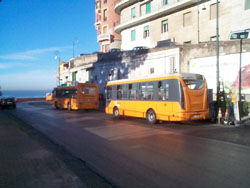 I
saw an item on the internet this morning about the psychological profile
of astronauts and the mental toughness (if that is the proper term)
it will take to put up with even 5 or 6 people you generally get along
with -- when that "getting along" has to occur on a 3-year mission to
Mars in a cramped space not much bigger than a few rooms in your house.
One Russian space veteran said that conditions like that "are a recipe
for homicide". One of the abilities required will be that of "alert
withdrawal" into someplace inside you own head --turn off the outside
world for a while, including the presence of that flight-engineer with
the annoyingly nasal voice-- yet remain tuned in to potential problems
that might arise. I
saw an item on the internet this morning about the psychological profile
of astronauts and the mental toughness (if that is the proper term)
it will take to put up with even 5 or 6 people you generally get along
with -- when that "getting along" has to occur on a 3-year mission to
Mars in a cramped space not much bigger than a few rooms in your house.
One Russian space veteran said that conditions like that "are a recipe
for homicide". One of the abilities required will be that of "alert
withdrawal" into someplace inside you own head --turn off the outside
world for a while, including the presence of that flight-engineer with
the annoyingly nasal voice-- yet remain tuned in to potential problems
that might arise.
The other
solution is to learn to redirect your hostilities to Mission Control.
Get your anger off the space-craft and aim it back where it belongs,
at the incompetent puppet-master nincompoops who sent you up here in
the first place. So, (1) meditative calm, and (2) blame everything on
people who are far way.
The best
candidates for such a task are Neapolitan bus-drivers. I have never
seen "road rage" in a bus-driver here. Believe me, it is frustrating
at times to realize that you are the only person in this city who really
knows how to drive, and that you are surrounded by maniacs, most of
whom are out to get you. When you are stuck in a traffic jam here (which
is much of the time), you feel like a lobster trapped in that
tank in the restaurant, tapping your tied-shut little crustacean pincers
uselessly against the inside of the glass, just waiting for that
fat guy at the corner table to point at you and say to the waiter, "That's
him. That's the one I want. Kill him."
At that
point, you look up to the front of the bus and the driver has a "ho-hum"
expression on his face. He is on some inner Elysian field, idling his
mind and engine at the same time. No rage. No beating on the horn. Nothing.
Just alert withdrawal, accompanied, no doubt, by thoughts of those really
responsible for all this -- the city government or perhaps the mechanic
who forgot to fix the brakes on the bus last night.
Snob
club
 The
paper reports that a group calling itself by the English name "Snob
Club" is going to convene at one of the most exclusive hotels along
via Parthenope, the seaside road at Santa Lucia near the Castel dell'Ovo.
These ridiculous people are going to eat truffles and then --ready?--
shine their shoes with champagne. The
paper reports that a group calling itself by the English name "Snob
Club" is going to convene at one of the most exclusive hotels along
via Parthenope, the seaside road at Santa Lucia near the Castel dell'Ovo.
These ridiculous people are going to eat truffles and then --ready?--
shine their shoes with champagne.
I know
two things about truffles:
1) intelligent
German shepherd dogs, yes, may dig them up on a direct order --but
they won't eat them ("Pee-yuuu! You must be kidding. There's your truffle,
maestro. Gimme a biscuit.) (This, as opposed to stupid pigs, which have
to wear snout rings to stop them from devouring the profits.)
(2) Rossini
once called truffles "the Mozart of mushrooms". What can I say? I still
like The William Tell Overture.
I know
nothing about shining shoes with champagne, but I am tempted to go down
there anyway just to hear these people mispronounce the name of their
own club as "znob". This is in keeping with the rules of Italian phonology.
(Such rules in your native language operate when you try to pronounce
a foreign language. That's why you have an "accent".) In Italian, phonetic
assimilation requires that voiced consonants such as "n" be preceded
only by other voiced sounds. Thus, an "s" -- normally pronounced as
the unvoiced sibilant ("sssssss") becomes voiced ("zzzzzzz"). I realize
that if you majored in ceramics or automotive repair, all this
may be of little interest to you.
Advertising
(1)
 At times I have taught a college
course in The Language of Advertising. I think, however, that it is
swiftly becoming a foreign language to me. Many of the billboard ads
near my house are so graphically striking that they distract from the
product name -- surely a mistake from the advertiser's point of view. At times I have taught a college
course in The Language of Advertising. I think, however, that it is
swiftly becoming a foreign language to me. Many of the billboard ads
near my house are so graphically striking that they distract from the
product name -- surely a mistake from the advertiser's point of view.
A delightful
example is the one in the photo (left): an infant is nursing at a huge
orange that has been graphically stylized to look like a mother's breast.
I didn't remember whether it was an ad for milk or orange juice. Now
that I look again, it's neither one. It's selling yougurt.
Some of
the ads are overtly pornographic. There is no subtle double-entendre
in that ad of the woman kneeling astride an ecstatic man and about to
descend to do what comes naturally usually only on Neapolitan television
stations at 1.30 in the morning (or so I have heard). It is just one
big clumsy single entendre Yet, I don't remember what those two are
selling. (If I remembered, though, I'd probably buy it.)
I saw one
yesterday that showed a dismembered mannequin -- torso here, leg over
there, head off to the side. All the body parts were nude, as if they
were lying there waiting to be pieced together in a department store
show window. And I don't remember what I am now supposed to be convinced
enough to go out and buy. Glue? Body parts?
Carbonari
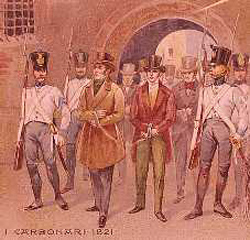 A
recent letter to editor in il Mattimo expresses outrage at the
fact that city fathers of Ottaviano, near Naples, want to open a Camorra
museum. ("Camorra" is the Naples Mafia.) What are they supposed
to display, the writer asks-- photos of blood-stained victims? Bullet-proof
vests? A list of all the poor people who still have no idea what has
happened to their family members? Is this the kind of phony romantic
rubbish you want to impress upon the minds of young people who visit
such a museum? The politicians, he says, have confused the "Camorra"
with the "Carbonari", indeed another secret society, but one
of the most important movements in the history of modern Italy. A
recent letter to editor in il Mattimo expresses outrage at the
fact that city fathers of Ottaviano, near Naples, want to open a Camorra
museum. ("Camorra" is the Naples Mafia.) What are they supposed
to display, the writer asks-- photos of blood-stained victims? Bullet-proof
vests? A list of all the poor people who still have no idea what has
happened to their family members? Is this the kind of phony romantic
rubbish you want to impress upon the minds of young people who visit
such a museum? The politicians, he says, have confused the "Camorra"
with the "Carbonari", indeed another secret society, but one
of the most important movements in the history of modern Italy.
When the
Neapolitan Republic fell in 1799, absolutism returned to the Kingdom
of Naples with a vengeance. The restored Bourbon monarchy punished the
"traitors" severely and infamously and went about 18th-century business-as-usual
in the new 19th century. The monarchy was again overthrown in 1806 by
Napoleon, who installed his relatives as king --first, his brother and
then his brother-in-law, Gioacchino Murat.
The subsequent
10-year French rule was, by most accounts, an improvement over the Bourbon
monarchy, but it was still an absolute monarchy (held in place by the
French) and, in spite of an Italian king, Murat, still very much rule
by a foreign power. It is during this period that liberal ideas of representative
government and eventual freedom from foreign rule went into hiding in
the form of the "carbonari", a secret society whose goal was to obtain
constitutional liberties for the kingdom.
When Ferdinand
returned to the throne in 1815, his kingdom was a nest of carbonari
--active and, in some case, armed cells of people from all walks
of life -- military officers, landlords, nobility, priests, and
peasants. They took the name "carbonari" from the trade of charcoal-burning,
practiced in Calabria, Abruzzi and Campania. They were divided into
Masonic-type lodges and had typically secret rituals, titles, in-group
signs of recognition, and an entire vocabulary --a code-- taken from
the charcoal trade. Their flag was red, white and black, a banner
that remained the symbol of liberal revolution in Italy until replaced
by red, white and green in 1831, colors still used today on the Italian
national flag. After the restoration of the Bourbon monarchy, they grew
in strength and were the focal point of the 1820 revolution that for
a time, at least, succeeded in wringing a constitution out of the autocratic
Bourbon ruler, Ferdinand I.
The uprising
of 1820 in Naples seemed successful at first. In spite of ruthless measures
to eliminate the secret society, Ferdinand was faced with the fact that
his own armed forces were honeycombed with carbonari. In July
1820 a military mutiny broke out at Caserta and the king was forced
into conceding a constitution for his kingdom, one modeled on the single-chamber
body of the Spanish constitution of 1812, itself the product of a revolution.
A situation
of liberal-revolutionaries in open hostility against the state and then
forcing constitutions on kings was not what the Congress of Vienna
had been about (in 1815 it had ended the Napoleonic interlude by restoring
the old order in most of Europe) . A new Congress was convened in Troppau
in 1820 to deal with the crisis. It essentially gave the King of Naples
the authority to seek aid from Austria. He left Naples after swearing
an oath to the constitution, hastened to the Austria of his old Hapsburg
in-laws (his first wife Caroline was a daughter of the empress Maria
Theresa) and returned with a 50,000-man army to put down the rebellion.
They were met by a Neapolitan force of 8,000, which they defeated at
Rieti on March 7, 1821. A few days later the King returned to Naples
in triumph --at the head of an Austrian army. He dismissed parliament
and tore up the constitution. The inevitable trials of "traitors" ensued,
followed by the inevitable executions shortly thereafter. It is from
this date that a constant foreign presence in Naples --either the Austrian
army or Swiss mercenaries-- was necessary to support what had become
the last bastion of absolutism in Europe.
During
the 1830s, carbonarist activity spread to Piedmont, Lombardy, Parma,
Modena, Romagna and the Papal States. It even attracted foreigners
who had taken up the cause of Italian unity: Lord Byron, for one. It
is for this identification with the cause of national unity that the
carbonari are historically seen as the forerunners of the Risorgimento,
the mid-19th-century movement to unify Italy, generally seen as starting
in earnest with the revolution of 1848.
From the
revolution of 1820 to the fall of the Kingdom of Naples in 1860, the
Bourbon rulers proved singularly inept at dealing with the forces of
liberalism other than through outright suppression. Bourbon absolutism
held the line in 1821, again in the great revolution of 1848, and was
only undone in 1860 when the kingdom fell to the forces of Giuseppe Garibaldi.
Camaldoli,
monasteries (2)
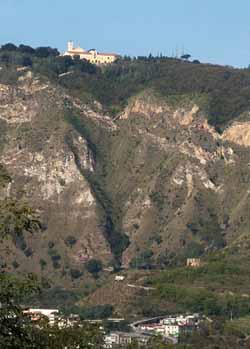 There
are still a number of monasteries in Naples, places of seclusion that
will take you as a paying guest for a few days and let you seek your Self.
One of the most tempting of such places is The Hermitage of Camaldoli
(photo, left). It sits on the hill in back of Naples at the highest point
in the city, between Vesuvius and the Flegrean
Fields. It was built in 1585 by the Camaldolese congregation of Montecorona
on the site of an earlier church. The large altar in the church is the
work of Cosimo Fanzago, and there are numerous prized paintings by such
artists as Fracanzano and Giordano. The Hermitage is still a ‘working’
monastery. There is a part, however, where visitors are received and the
gardens overlooking the city to the south are on occasion open to the
public. There
are still a number of monasteries in Naples, places of seclusion that
will take you as a paying guest for a few days and let you seek your Self.
One of the most tempting of such places is The Hermitage of Camaldoli
(photo, left). It sits on the hill in back of Naples at the highest point
in the city, between Vesuvius and the Flegrean
Fields. It was built in 1585 by the Camaldolese congregation of Montecorona
on the site of an earlier church. The large altar in the church is the
work of Cosimo Fanzago, and there are numerous prized paintings by such
artists as Fracanzano and Giordano. The Hermitage is still a ‘working’
monastery. There is a part, however, where visitors are received and the
gardens overlooking the city to the south are on occasion open to the
public.
Whenever
I mention that I would like to spend some time there, those who know
and love me (not necessarily the same group of people) usually look
up and say, "What's a river in South America with six letters beginning
with L?"
Yet, I
often dream of showing up there some morning. First, I imagine preparing
my Soul Searching and Enlightenment survival kit. I can't go into this
thing unprepared:
-Laptop
computer: check.
-Portable multi-system TV/VCR: check.
-Supply of SEAL Team training videos: check.
-Global Positioning System receiver, providing latitude, longitude,
UTM and OSGB: check.
-Rappelling Harness, featuring two forged steel attachment
rings proof-loaded at 5,000 pounds: check.
-Portable dead-bolt, requiring no tools and installing in seconds
to any exterior or interior standard door and withstanding up
to 1,700 pounds of pressure-- (even those of you with marginal
SAT math scores can see that "up to 1,700 pounds" could also mean
three pounds): check.
-Survival Straw, a highly efficient drinking system that removes
harmful bacteria, chlorine, pesticides and water-soluble heavy
metals from at least 4,000 gallons of water: check.
-A box of cigars: check. |
 About
the cigars --I don't smoke them, but I'm not sure about the monks. My
view of monks was forged in the crucible of Eugene Pallette's (photo)
great portrayal of Friar Tuck in the 1938 Warner Bros. epic, The
Adventures of Robin Hood. He was a pretty swashbuckling guy;
he drank wine, ate mutton (whatever that is) and cudgeled lots of heads
according to the medieval monastic dictum that it better to cudgel first
and ask questions later. (WHAM! "Are you saved, my son?") Thus, if they
had had cigars in Friar Tuck's day, he would have smoked them. About
the cigars --I don't smoke them, but I'm not sure about the monks. My
view of monks was forged in the crucible of Eugene Pallette's (photo)
great portrayal of Friar Tuck in the 1938 Warner Bros. epic, The
Adventures of Robin Hood. He was a pretty swashbuckling guy;
he drank wine, ate mutton (whatever that is) and cudgeled lots of heads
according to the medieval monastic dictum that it better to cudgel first
and ask questions later. (WHAM! "Are you saved, my son?") Thus, if they
had had cigars in Friar Tuck's day, he would have smoked them.
Now, some
of you spiritual sluggards may think that monkdom is one monolithic
flying wedge of undifferentiated belief. Nothing could be further from
the truth. (Well, the statement, "When acid is added to an aqueous
solution, the pH rises," is further from the truth, but that is neither
here nor there —though it might be somewhere else.)
As a matter
of fact, different monastic orders say truly catty things about
one another. For example, Benedictines may tell you that Franciscans
drink too much; Franciscans may tell you that Dominican choirs don't
sound much better than Little Richard (or, Parvus Ricardus,
as they put it); the Carthusians, of course, invented the color charteuse,
"But what have they done for us lately?” ask most other monastic
orders. Trappists, of course, don't talk about other monks because Trappists
have taken a vow of silence, which they break only once a year to complain
about the incessant racket of sandals shuffling in the abbey corridor.
And no one has anything good to say about a cappuccino whipped up by a Capuchin friar
(though the Capuchin monkey, cebus capucinus, native to Central
and South America, is said to brew a pretty tasty cup of Java, which
is nowhere even near Central or South America).
Also, no
one bad-mouths the Jesuits, because they
are the Bad Dudes on the monastic block —lean, mean, intellectual
Soldiers of the Faith. Attila the Nun may have whacked you across the
knuckles with a ruler for stumbling on, "How much is eight times seven,"
but a Jesuit will drop-kick you off the triforium for hesitating on,
"Quick, what is the exception to Aquinas' idea that all
beings are composed of potential and actual principles?" (Hint: Don't
say fifty-six.) (Note to myself: add a multi-purpose Jesuit Army Knife
to my survival kit; the Inquisition blade, alone, makes a Swiss Army
Knife look like Lichtenstein.
So, one
morning, I show up at the door of the monastery and summon a monk with
an enormous knocker. (Yes, a mutant sporting a misplaced modifier)...
That is
the point in my dream where I usually awaken.
Euro,
the (1)
 The
only people not complaining about the change from the lira to the euro
seem to be those who make a living from tips. In the days of the lira,
it was common practice to leave a 100 lire coin—or 200, at most—as
a tip for a coffee in the mornings at the local cafe. The equivalent
of 100 lire, today, is the itsy-bitsy copper 5-cent coin. The 10-cent
coin is a bit better; at least it is bronze and shiny. Nevertheless,
it now quite common to see people leaving the next highest denomination,
the 20 cent coin. That is a substantial increase in the average tip.
No one wants to be seen plopping down paltry combinations of 1, 2 and
5-cent coins. Just leave 10 or 20. So far, the only use I have seen
for the 5-cent coint, by itself, is in coin-operated lifts. Some apartment
buildings, outrageously, make you pay to get up to your own flat. The
excuse is that it keeps kids from riding up and down all day long for
free and fun. The
only people not complaining about the change from the lira to the euro
seem to be those who make a living from tips. In the days of the lira,
it was common practice to leave a 100 lire coin—or 200, at most—as
a tip for a coffee in the mornings at the local cafe. The equivalent
of 100 lire, today, is the itsy-bitsy copper 5-cent coin. The 10-cent
coin is a bit better; at least it is bronze and shiny. Nevertheless,
it now quite common to see people leaving the next highest denomination,
the 20 cent coin. That is a substantial increase in the average tip.
No one wants to be seen plopping down paltry combinations of 1, 2 and
5-cent coins. Just leave 10 or 20. So far, the only use I have seen
for the 5-cent coint, by itself, is in coin-operated lifts. Some apartment
buildings, outrageously, make you pay to get up to your own flat. The
excuse is that it keeps kids from riding up and down all day long for
free and fun.
Those hustling
at street corners—selling packs of tissues or cleaning the windshield
of your car—used to charge (or expect) one-thousand lire, the
lowest denomination of paper money. It was a handy and a reasonable
price. It is equivalent to 50 new cents, a handy coin, but one that
most people don't seem to like. There is a tendency to view the shiny
€1 coin as the new unit for that type of quick service. The guy
with the squeegee doesn't demand €1, true, but looks crossways
at you if you give him 50 cents ("Why, you cheap so-and-so"). So, you
cave in and give him twice as much as you used to. The general complaint
is about so–called “micro-inflation,” referring to
the blatant “rounding up” of prices. Stores converted the
old lire price to euros, came out with, say, €1.87, and rounded
it up to €2. In some cases, there seems to have been a doubling
of prices: that is, a service that used to cost 100 thousand lire now
costs €100, twice as much—but it looks the same, and that
is the deception involved. I complained about this to a plumber. "That's
double what it used to cost in lire," I said. "We don't use lire, anymore,"
he said, as if that true statement were some sort of explanation. The
phenomenon is apparently Europe-wide. Germans commonly refer to the
"euro" as the "teuro," a pun on "teuer," the German word for "expensive".
I was very
optimistic at the time of the change-over. I knew that things were bad
in the Balkans, in Chechnia, and in many other places I couldn’t
spell, but, on the bright side, at least in my part of the world—central
Europe—peace and tranquillity had finally reared their cute little
heads. Yes, traditional enemies still sneered at each other’s
total lack of morals and personal hygiene, but, on the other hand, they
now swarmed over former enemy territory only on peaceful duty–free
shopping binges. Tribal massacres were still found at football matches,
sure, but that was ok, because that was a lot better than it had ever
been. In short, things had not been so quiet here since everyone was
killed in the Thirty Years War. United Europe, then, was at hand. The
flag was up and flapping, the Chunnel was in, and the national anthem,
though, not official, seemed to have gone by default to the happy snappy
Ode to Joy with music by Ludwig van Beethoven and text by Friedrich
Schiller—not exactly Rodgers and Hart, but not bad.
There was
even a common language called ‘money’—the €—
and everyone was in a hurry to learn lots of it real fast. The goal,
then, was economic union—one big prosperous family earning and
spending the same currency. Make it in Sicily, spend it in Copenhagen.
(That might have to wait until Denmark decides to convert to the euro.)
For a while, before the changeover, the main problem was what to call
the new currency. ‘Ecu’ (European Currency Unit) was an
early solution—and a terrible one. I wouldn’t be caught
dead spending anything as ugly as an ‘ecu’, maybe because
it sounds too much like ‘eco–’, as in ‘ecology,’
or ‘eco–this’ and ‘eco–that’. I’m
not ready for European financial puns on ‘ecu–logical disaster’.
On the
other hand, the Germans are said to have loved ‘Ecu’ since
it sounded exactly like ‘Eku’, the name of one of those
potent German beers, which can really devalue the inside of your skull.
The French were happy with Ecu, too, since it sounded a lot like ‘ecu’,
the word for an archaic French coin. Other candidates around Europe,
were—not surprisingly—the Euromark, Eurolira, Europound,
and Eurofranc. Or we might have fallen back on archaic terms: the Eurothaler,
Eurodoubloon or Eoroducat—or maybe exotic currencies such as Euroyen.
Now, that had a ring to it, as did another of my favorites, the Eurosemolian,
or the slangy but catchy Eurobuck, Euroquid and Eurosmacker. I recall
that my childhood heroes on Space Patrol solved a similar problem
with something called a "Galactic Credit." That might have worked.
|
